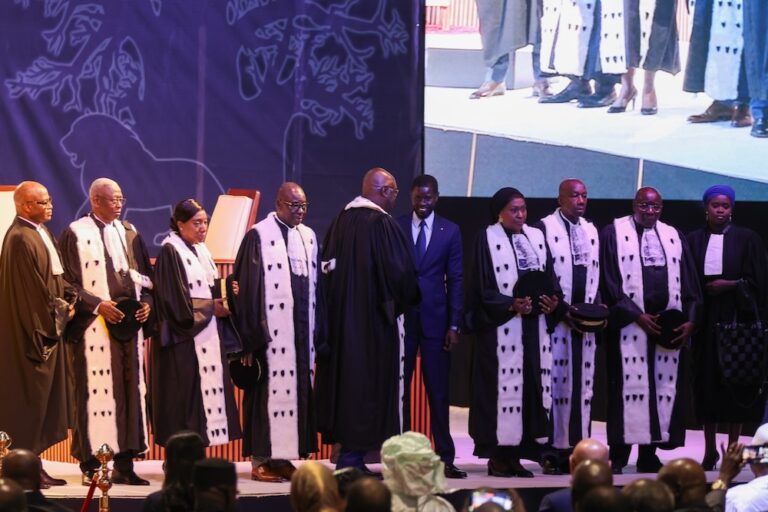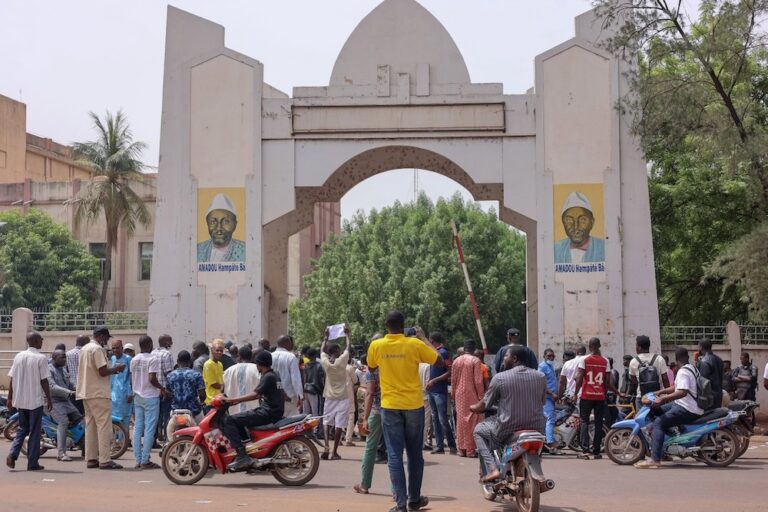(WAJA/IFJ/IFEX) – The following is a 30 March 2001 joint WAJA, IFJ and National Journalists Union Of Mali (UNAJOM) report: INTERNATIONAL FEDERATION OF JOURNALISTS (IFJ) WEST AFRICAN JOURNALISTS ASSOCIATION (WAJA) NATIONAL JOURNALISTS UNION OF MALI (UNAJOM) MONITORING VIOLATIONS OF MEDIA FREEDOM IN WEST AFRICA BAMAKO, 29 and 30 March 2001 The delegates of the following […]
(WAJA/IFJ/IFEX) – The following is a 30 March 2001 joint WAJA, IFJ and National Journalists Union Of Mali (UNAJOM) report:
INTERNATIONAL FEDERATION OF JOURNALISTS (IFJ)
WEST AFRICAN JOURNALISTS ASSOCIATION (WAJA)
NATIONAL JOURNALISTS UNION OF MALI (UNAJOM)
MONITORING VIOLATIONS OF MEDIA FREEDOM IN WEST AFRICA
BAMAKO, 29 and 30 March 2001
The delegates of the following journalists associations, press houses and media observatories:
The Union of Journalists of Mali, the Mali press house and observatory, Sierra Leone Association of Journalists, Gambia Press House, Togo Press House, Press House Norbert Zongo of Burkina Faso, Union of Journalists of Senegal, Association of Journalists of Niger, International Press Center, Nigeria, Association of the Independent Press in Mauritania, media observatories of Senegal and Benin, Ghana Journalists Association and the Ghana Journalists’ Ethics Committee
Coming together at the seminar on “monitoring violations of media freedom in West Africa”, held in Bamako (Mali) from 29 to 30 March 2001 as part of the Media for Democracy programme, supported by the European Commission, and at the invitation of the Mali Union of Journalists, declared:
CONCLUSIONS AND RECOMMENDATIONS
– We condemn any form of violation of press freedom and journalists’ rights in West Africa;
– We call on the governments of West Africa to immediately stop attacks on press freedom where they occur;
– We express our solidarity with all journalists who are threatened and harassed for carrying out their profession;
– We protest against any arbitrary arrest, detention and harassment against journalists in West Africa;
– We call on WAJA to increase responses and protests against violations of press freedom in the sub-region.
The participants adopted the following recommendations:
1) Recommendations concerning Press Houses
The meeting agreed that the principal aims of the press houses are to serve as a meeting point for all journalists and to bring together the journalistic profession in support of media freedom and media pluralism. The press houses play different roles in different countries depending on the needs of the profession and their evolution. In this context press houses organise a range of activities for the benefit of journalists, for instance, publicising attacks on media freedom and journalists’ rights or organising further training where appropriate.
The press houses should focus on:
– The need to work together;
– Publishing clear and transparent reports of accounts and activities;
– Up-dating their web sites and linking them to the WAJA web site;
– Organising management training for press house staff;
– Organising exchange of information and advice on preparing project proposals and seeking donor funding among the press houses in the different countries.
The press houses call on:
– WAJA and IFJ to help the press houses obtain funds;
– WAJA members to be more active in mobilising their members;
– WAJA to act more quickly in cases of violations of press freedom.
2) Recommendations concerning the Media Observatories
The need for media observatories is recognised in virtually all countries of West Africa but the observatories need to receive the means to ensure their proper functioning.
The media observatories should focus on:
– Preparing a clear and realistic budget.
– Promoting ethical standards focusing on one specific problem rampant in West African journalism: the use of per diems.
– Informing on the problem of working conditions and calling for the adoption of collective agreement as a safeguard for journalists’ ethics.
– Lobbying for access to assistance funds for the press to be depended on the ethical conduct of the media as defined by the code of ethics of the journalists and monitored by the media observatories;
– Launching a website for the network RIAAM (Network of African Media Self-regulatory Bodies);
– Preparing a report on the state of media ethics;
– Seeking diverse sources of funding from local organisations and authorities and from outside donors.
The media observatories call on:
– The press houses, where they exist, to provide space for the observatories to function;
– The journalists’ associations to support the observatories and help them have an office in order to carry out their mission (publication of communiqués and statements);
– WAJA and the IFJ to support the lobbying against the per diem culture in journalism and other ethical problems, for the adoption of collective agreements and for making access to assistance funds for the press dependent on the respect of the code of ethics;
– IFJ and GRET to assist the observatories to seek funding and to obtain flexible arrangements for funding from donors that respond to the different needs of the different observatories.
3) Recommendations concerning WAJA (UJAO)
– WAJA should be open for membership to all journalists’ organisations in the region that are in line with the WAJA constitution. At the same time, WAJA should continue to promote unity in the profession and should therefore establish criteria for admission and membership that take into account the level of representation and activity of each journalists’ association or union.
– It is recognized that WAJA cannot solve all problems of member associations and unions at the national level but WAJA can offer its advice and moral support to members faced with difficulties.
– WAJA should use and further promote the press houses to regroup the journalists’ profession and to organise exchange of information especially in publicising attacks on media freedom and journalists’ rights.
– On the question of payment of fees to WAJA it was recommended that WAJA could either maintain the current level of fees of 100,000 CFA or could consider a system of proportional representation and payment of fees in force in the IFJ including the rules for expulsion of members who fail to meet their obligations. This should be done in the framework of more formal relations with the IFJ.
– WAJA should seek funding to provide a full version of the WAJA web site and the Freedom link newsletter in English and in French.
– The meeting welcomed the decision of the President of Senegal, Abdoulaye WADE, to establish, with the support of the Senegalese state, a press house that will accommodate SYNPICS, WAJA and the co-ordination of the Media for Democracy programme. The meeting appreciated this decision and wished its quick implementation.
– The president and the General Secretary of WAJA should publish communiqués each time they participate in meetings on behalf of WAJA.
– The meeting welcomed the good relations between WAJA and IFJ, between WAJA and IFEX, as well as ECOWAS, where WAJA has observer status. It called on WAJA to continue to intensify relations with these and other relevant organisations.
– The meeting agreed that in order to prepare for the next WAJA Congress, the General Secretary should circulate the WAJA statutes for their comments.
– It was further agreed to establish a committee to prepare proposals to the next WAJA Congress, consisting of:
1) WAJA President Kabral Blay-Amihere
2) General Secretary Alpha Sall
3) Ousmane Maiga, UNAJOM, Mali
4) Ibrahim Tayyil Bah, SLAJ, Sierra Leone
5) Gabriel Baglo, Media for Democracy Co-ordinator for West Africa.
Bamako, March 30th, 2001


